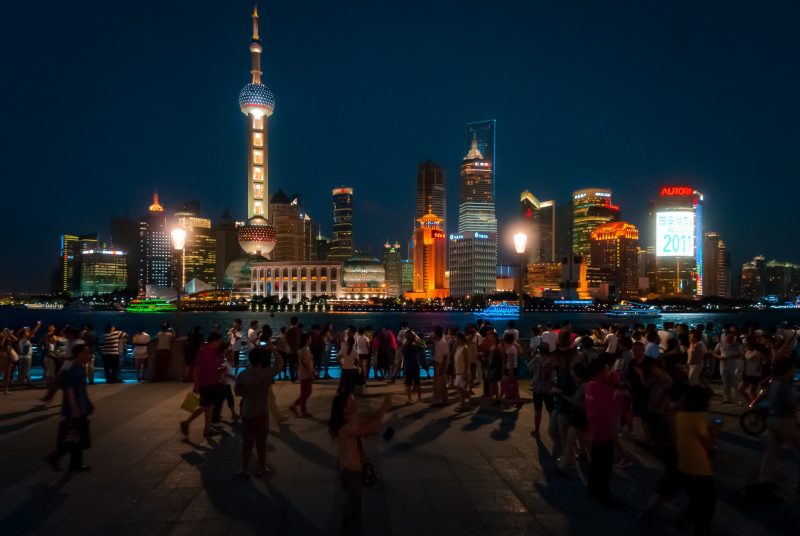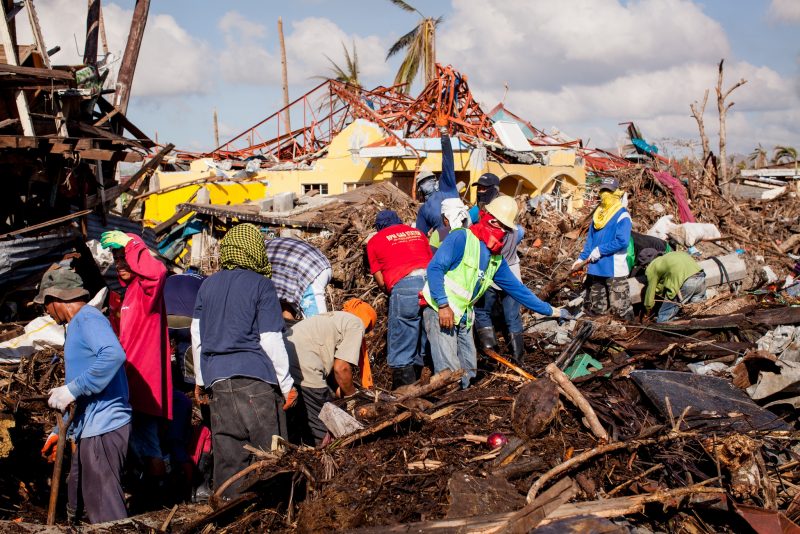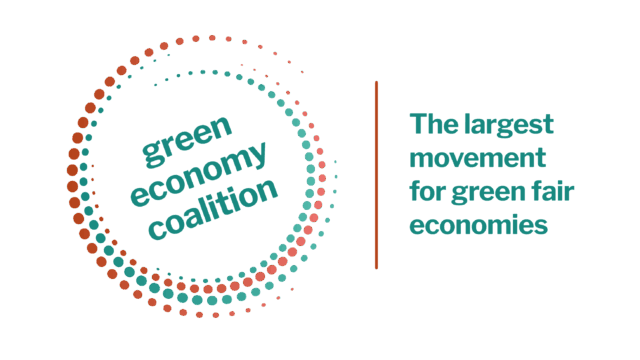Global action to accelerate green economy reform
Our new Green Economy Tracker rates global progress towards a fairer, greener future

The global economy is not fit for purpose and is a direct cause of social and environmental breakdown, the Green Economy Coalition warns today in Davos as it launches a programme to assess and accelerate policies for reform around the world.
The Green Economy Tracker is the first tool to benchmark how countries are transitioning towards greener, fairer economic systems, assessing progress and highlighting “best in class” policies that are already driving change towards a safer future.
It is complemented by GEC’s Global Green Economy Barometer 2020, a report which reviews developments across key policy areas and makes recommendations for action to accelerate the transition.
The top five global risks most likely to have a major impact in the next decade are all environmental, according to the World Economic Forum’s latest Global Risks Report, released last week. It also highlights the dangers of rising inequality, noting that: “Disapproval of how governments are addressing profound economic and social issues has sparked protests throughout the world.”
The Tracker and Barometer respond to growing calls for economic reform from central bankers, insurers and businesses in the face of systemic risk posed by climate change and biodiversity loss, and they were presented to leaders from business, government and civil society at the World Economic Forum in Davos last night.
GEC Convenor Oliver Greenfield said: “Our global economy is not fit for purpose and is driving social and environmental breakdown. Inequality, poverty, climate change and biodiversity loss are not just connected, they arise from the same root cause: how our economies are organised, ruled and managed. Tackling these problems without economic reform is like trying to build a Tesla with wooden tools.
“Within a generation we need to move to a green and fair economy that respects nature’s limits and prioritises wellbeing. The good news is that this transformation is already happening. We are working with experts from around the world to accelerate it by setting out a framework for economic reform, highlighting the best policies that are already driving change, and giving citizens the information they need to hold their governments to account.”
“ Inequality, poverty, climate change and biodiversity loss are not just connected, they arise from the same root cause: how our economies are organised, ruled and managed. Tackling global problems without economic reform is like trying to build a Tesla with wooden tools.”
The tracker highlights key reforms being pioneered by countries around the world, showing that a new economic agenda that puts people and planet first is possible and emerging in some unexpected places.
- China is developing the largest carbon market in the world, covering 40% of its emissions.
- Bangladesh and Trinidad & Tobago, two countries severely exposed to climate risks, are leading the way in ‘stress testing’ banks’ resilience to environmental disasters.
- Mongolia is one of the few countries to seriously address the social and labour market challenges and opportunities of the green economy with a national green jobs strategy.
- Small business support is vital to ensure a vital sector of the economy can go green:
- Malaysia is making social enterprise a key part of its economy, supporting mission-driven entrepreneurs to develop solutions to social and environmental challenges.
Guy Ryder, General Secretary of the International Labour Organization, said: “People must see their lives improve – so a just transition is not just an aspiration, it is a prerequisite to ensure societal and worker support and therefore success.”
Frank Elderson, Executive Director of the Bank of the Netherlands and chairman of the Network for Greening the Financial System, which represents 36 central banks of five continents, has warned: “A transition to a green and low-carbon economy is not a niche nor is it a ‘nice to have’ for the happy few. It is crucial for our own survival. There is no alternative.”

The tracker is a publicly available online tool that draws on expert insight to assess countries’ progress on 20 key policies in five key areas. It rates the ambition of 20 high, middle and low-income countries, and GEC plans to update it regularly and add further countries until it achieves full global coverage.
It finds that no single country is yet pursuing a deep and consistent green economic reform agenda, but global leaders are emerging:
- Sweden and France rate highest with national green economy plans, and many other progressive policies including a jointly developed comprehensive green finance plan.
- The UK is close behind. It has pioneered legally binding carbon budgeting as well as methods to value the services nature provides, which put the value of UK natural capital at £761 billion including pollution removal, carbon sequestration and recreation.
- Costa Rica also scores highly, showing that size is no barrier to ambition. It has a national green economy plan and generates almost all its electricity from renewables.
The tracker also sounds a warning bell where countries are dragging their feet on key policies:
- Brazil, Peru, Botswana and Senegal, all globally significant hotspots of biodiversity, have minimal policies to protect their natural resources and disincentivise damaging activities.
- Countries with big oil and gas sectors are divided on green finance: the United Arab Emirates is promising bold investments to decarbonise and diversify its economy, but like Canada and Trinidad & Tobago is stalled on how to break its dependence on fossil fuel exports.
- Few governments have yet taken steps to reform their welfare and social protection systems to soften the landing for millions of workers whose jobs are at risk from automation and decarbonisation.
“ We will betray future generations if we cling to our current economic model. Green economic reform must be central to the new model of stakeholder capitalism.”
The Tracker and Barometer build on a framework for green economic reform launched by leading global labour, economic and environment institutions in July 2019. The high-level group which included the OECD, ILO, UNDP, UNEP and GEC called for a new approach to managing economies which puts people and nature first in Principles, priorities and pathways for inclusive green economies: Economic transformation to deliver the SDGs.
Speaking at the time Angel Gurría, OECD Secretary-General, said: “Our policies have to be made with our children’s future in mind. Leaders need to think big and act bigger. This radical transformation demands a profound systemic change, and we are all part of this system.”
André Hoffmann, vice-chairman of the multinational healthcare company Hoffmann-La Roche, who hosted the Davos dinner where the Tracker and Barometer were discussed, said: “We will betray future generations if we cling to our current economic model. Green economic reform must be central to the new model of stakeholder capitalism set out in the Davos Manifesto where companies actively set out to improve the state of the world.”
Richard Mattison, CEO of Trucost, part of S&P Global, said: “Our latest research shows that 60% of S&P500 companies, with a market capitalisation of $18 trillion, hold assets that are at high risk of at least one type of climate-related physical event. It’s critical that companies fully understand their impact and dependency on ecosystems as well as the impact of a changing climate on their business operations.”

The GEC is an alliance of more than 50 organisations across six continents including global governance institutions, businesses, trade unions and civil society organisations. It has identified five key interventions needed to deliver a green and fair economy, and the tracker assesses four key policies in each area.
Policies for a green and fair economy
Measuring and Governing
GDP alone says nothing about the health of people or the state of nature. New ways to run economies are needed that protect nature and enhance wellbeing as well as producing profits.
- Sweden is the clear leader. It has embraced the idea of greening the whole economy with a national green economy plan delivered across dozens of separate policies.
- Sweden consults on all legislation, providing the inclusive governance needed to ensure citizens support change.
- Sweden has an SDG business strategy requiring corporations to make annual reporting consistent with the UN Sustainable Development Goals.
- Wealth accounting complements GDP, giving a more complete picture of the economy by measuring physical, natural, human and social capital. New Zealand (not assessed in the Tracker) is a global leader with its December 2018 Living Standards Framework.
Reforming Financial Systems
New regulations and institutions are needed to encourage green and social investment for the long-term and penalise ‘brown’ finance and short-term speculation.
- France and Sweden have together developed a comprehensive green finance plan, with stronger disclosure obligations, climate stress testing for banks, and new green bonds.
- India is pioneering green fiscal and monetary policy with a trading scheme encouraging energy intensive sectors to become more efficient and a programme to boost green investment.
- Bangladesh and Trinidad, both severely exposed to environmental risks, lead in ensuring safe and accountable banks: their central banks factor environmental disasters into stress testing.
- Pricing carbon is a simple way to make economies greener. China is developing the largest carbon market in the world covering 40% of the country’s emissions.
Greening Economic Sectors
A new industrial revolution is required to transform sectors such as energy, food and transport, and mitigate their impact on our climate and environment.
- Uganda’s Green Growth Development Strategy is a model of a green sectoral policy plan, providing strategic direction for key sectors and an advisory body to oversee implementation.
- Carbon budgeting is one of the weakest policy areas but the UK and France are leaders, with binding targets and independent monitoring bodies to keep governments on track.
- A clean energy policy is a priority, with over a third of greenhouse gas emissions coming from this sector. Costa Rica has one of the strongest policy frameworks. Renewable sources provide almost all its electricity and its 2019 Decarbonisation Plan aims to cut emissions from transport.
- Small business support is vital to ensure a vital sector of the economy can go green: Malaysia is making social enterprise a key part of its economy, supporting mission-driven entrepreneurs to develop solutions to social and environmental challenges.

Tackling Inequality
Our current economic model leaves too many people behind. The world’s poorest are on the frontlines of climate change and growing inequality risks fracturing communities.
- Mongolia is one of the few countries to seriously address the social and labour market challenges and opportunities of the green economy with a national green jobs strategy.
- Pro-poor policy aims to ensure that green policies benefit the poor and drive a just transition that works for everyone. China, South Africa and Senegal have strongest policies.
- Participatory policymaking consults citizens about what they want and need from the green economy transition. Peru, Sweden and Canada have most innovative approaches.
- Innovative social protection schemes support a just transition. Malaysia’s 2019 BR1M policy gives low-income households an unconditional US$240 monthly payment.
Valuing Nature
Our economies and societies cannot function without clean water, healthy soils, pollination and the other vital services nature provides. Recognising nature’s true value will help to protect it and ensure that humans and ecosystems flourish together.
- Canada has taken the most comprehensive approach to ocean and land conservation with a concrete strategy for each UN sustainable development goal and a clear implementation plan.
- Natural capital accounts track key resources such as mineral reserves, biodiversity and clean air. The UK is a world-leader – it put the value of the country’s natural capital at £761 billion in 2015, including services such as recreation, pollution removal and carbon sequestration.
- The UK also sets the gold standard for ensuring that natural capital accounting informs policymaking with an independent natural capital committee.
- Nature-based fiscal reform channels funds towards nature and reforms incentives for unsustainable economic activity. Canada has pledged to phase out fossil fuel subsidies by 2020.
- ENDS -
For more information, please contact:
Mayowa Ogunremi, mayowa.ogunremi@greenhousepr.co.uk - 07943 517418
Will Vowell, will.vowell@greenhousepr.co.uk - 07532 044844
David Mason, david.mason@greenhousepr.co.uk - 07799 072320
The Green Economy Coalition is a global alliance of NGOs, researchers, institutions and think tanks that supports social dialogue, policy research and communications to accelerate the transition to green and fair economies.


